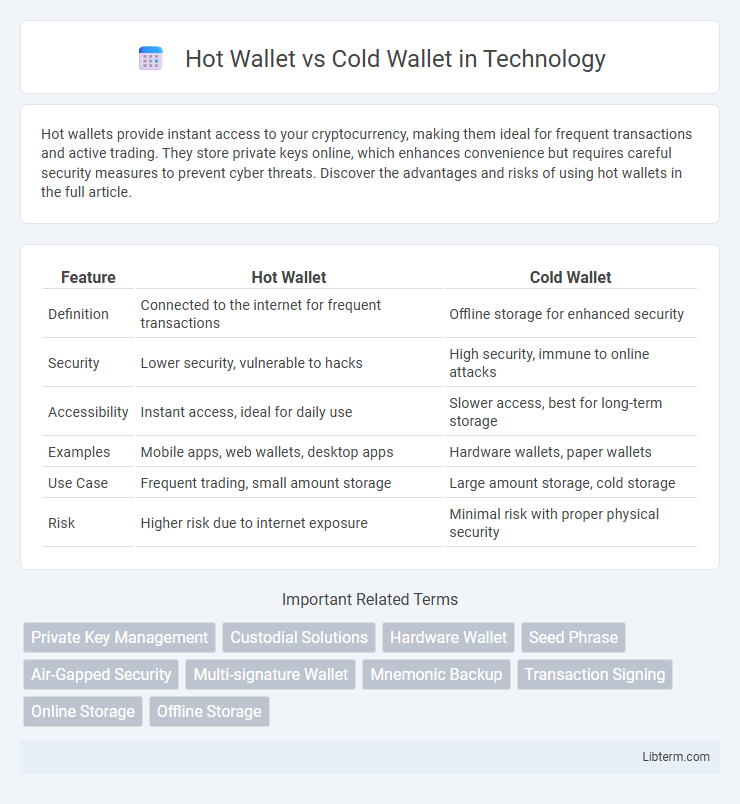Hot wallets provide instant access to your cryptocurrency, making them ideal for frequent transactions and active trading. They store private keys online, which enhances convenience but requires careful security measures to prevent cyber threats. Discover the advantages and risks of using hot wallets in the full article.
Table of Comparison
| Feature | Hot Wallet | Cold Wallet |
|---|---|---|
| Definition | Connected to the internet for frequent transactions | Offline storage for enhanced security |
| Security | Lower security, vulnerable to hacks | High security, immune to online attacks |
| Accessibility | Instant access, ideal for daily use | Slower access, best for long-term storage |
| Examples | Mobile apps, web wallets, desktop apps | Hardware wallets, paper wallets |
| Use Case | Frequent trading, small amount storage | Large amount storage, cold storage |
| Risk | Higher risk due to internet exposure | Minimal risk with proper physical security |
Introduction to Crypto Wallets
Crypto wallets serve as digital tools for securely storing and managing cryptocurrencies, with hot wallets connected to the internet enabling quick transactions and cold wallets offline devices offering enhanced security against hacks. Hot wallets, such as mobile apps and web wallets, provide convenience for frequent trading but carry higher risks of cyberattacks. Cold wallets, including hardware wallets and paper wallets, protect assets with offline storage, making them ideal for long-term holding and safeguarding against unauthorized access.
What is a Hot Wallet?
A hot wallet is a cryptocurrency storage solution connected to the internet, enabling quick access and real-time transactions for digital assets like Bitcoin and Ethereum. These wallets are commonly used for daily trading or spending due to their convenience but are more vulnerable to hacking and cyber threats compared to cold wallets. Examples of hot wallets include mobile apps, desktop software, and web-based platforms that store private keys online.
What is a Cold Wallet?
A cold wallet is a type of cryptocurrency storage device that remains completely offline, providing enhanced security by isolating private keys from internet exposure and hacking risks. Typically implemented through hardware wallets or paper wallets, cold wallets protect digital assets from cyber threats by eliminating network connectivity. This offline storage method is essential for long-term holding of cryptocurrencies, ensuring maximum protection against unauthorized access and theft.
Key Differences Between Hot and Cold Wallets
Hot wallets store cryptocurrency online, providing quick access for frequent transactions but are more vulnerable to hacking due to constant internet connectivity. Cold wallets keep private keys offline, significantly enhancing security by isolating funds from online threats, making them ideal for long-term storage. The primary distinction lies in accessibility versus security, with hot wallets favoring convenience and cold wallets prioritizing protection.
Security Comparison: Hot Wallet vs Cold Wallet
Hot wallets store private keys online, making them more vulnerable to hacking, phishing, and malware attacks due to constant internet exposure. Cold wallets keep private keys offline, significantly reducing the risk of unauthorized access, hardware theft, or digital breaches by isolating assets from internet connectivity. Security experts recommend cold wallets for long-term storage of large cryptocurrency holdings, while hot wallets are preferred for frequent transactions and smaller amounts.
Accessibility and Convenience
Hot wallets provide immediate access to cryptocurrencies through internet connectivity, enabling quick transactions and easy account management via smartphones or web browsers. Cold wallets, stored offline on hardware devices or paper, prioritize security by minimizing exposure to cyber threats but require physical access for transactions, reducing convenience. The choice between hot and cold wallets depends on balancing the need for fast, frequent access with the priority for enhanced security and long-term storage.
Use Cases for Hot Wallets
Hot wallets are ideal for frequent cryptocurrency traders and users who need quick access to their digital assets for everyday transactions. These wallets support real-time payments, decentralized application interactions, and rapid portfolio management on exchanges or mobile devices. Their online connectivity makes them perfect for active users requiring convenience despite higher security risks compared to cold wallets.
Use Cases for Cold Wallets
Cold wallets are ideal for long-term cryptocurrency storage due to their offline nature, significantly reducing exposure to hacking and phishing attacks. They are extensively used by institutional investors and cryptocurrency holders who prioritize security over transaction speed, storing large amounts of digital assets securely. Cold wallets also support safe backup and recovery options, making them essential for preserving private keys without internet connectivity risks.
Pros and Cons of Hot Wallets
Hot wallets offer quick and convenient access to cryptocurrencies, enabling seamless transactions and real-time trading on exchanges. However, their constant internet connectivity exposes them to higher risks of hacking, phishing attacks, and malware, making them less secure compared to cold wallets. Users benefit from fast accessibility but must balance this against potential vulnerabilities and the need for robust security practices.
Pros and Cons of Cold Wallets
Cold wallets offer enhanced security by storing cryptocurrency offline, significantly reducing the risk of hacking and unauthorized access. However, they lack the convenience of instant transactions and require careful physical protection to prevent loss or damage of the storage device. Despite limited accessibility, cold wallets are ideal for long-term crypto investors prioritizing security over quick trading.
Hot Wallet Infographic

 libterm.com
libterm.com